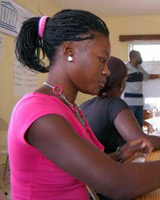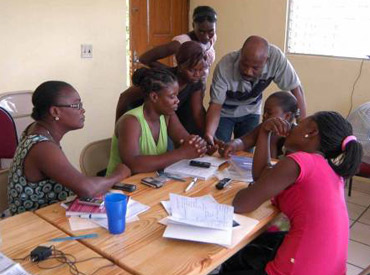UNESCO supports training for women journalists in Haiti
29-07-2010 (Port-au-Prince)

REFRAKA’s training
© UNESCO
UNESCO supported the Haitian women’s media association REFRAKA in organizing training for women journalists from different regions of the country. The three-day workshop focused on the production of reports and shows, interviewing techniques and editing. UNESCO believes that increasing the capacity of women journalists can have a positive impact on the gender situation in Haiti.
The position of women journalists within the Haitian media has always been a key concern for UNESCO, whose efforts aim at promoting gender equality among media professionals. This priority has become all the more significant following the damage caused by the recent earthquake, which destroyed the premises and most of the equipment of REFRAKA, a network of 26 Haitian women’s community radio stations.
Since 2001 REFRAKA has been providing training for women journalists. “Our objective is to increase the capacity of women communicators and to enable them to take care about other aspects of the work in their radio stations,” explains Samia Salomon, co-head of REFRAKA and trainer in the UNESCO workshop. “For example, some women, who are at the moment only DJ presenters, will be trained to write news reports, prepare features, make interviews and produce an educational magazine in different formats. We are showing women that they don’t need a Master of Arts in literature to carry out this kind of work.”
UNESCO considers that communication, in particular through community radio, is an essential way to reach the Haitian population. The radio has an important role to play in community outreach, including raising awareness about specific problems faced by women, such as sexual health, childcare, education and gender issues. In general, Haitian women have lower levels of education than men and are more often victims of violence and discrimination in terms of education and professional opportunities. Increasing the presence of qualified women journalists and radio presenters is likely to have a positive impact on this situation.
For these reasons, UNESCO decided to support REFRAKA in organizing training for 15 women journalists and radio presenters. Every trainee received a digital recorder and a USB flash drive for their future work. In addition, UNESCO provided a complete production studio in Port-au-Prince to REFRAKA, which will enable the association to restart the production of its own radio programmes, in particular of a popular broadcast on education.
Since 2001 REFRAKA has been providing training for women journalists. “Our objective is to increase the capacity of women communicators and to enable them to take care about other aspects of the work in their radio stations,” explains Samia Salomon, co-head of REFRAKA and trainer in the UNESCO workshop. “For example, some women, who are at the moment only DJ presenters, will be trained to write news reports, prepare features, make interviews and produce an educational magazine in different formats. We are showing women that they don’t need a Master of Arts in literature to carry out this kind of work.”
UNESCO considers that communication, in particular through community radio, is an essential way to reach the Haitian population. The radio has an important role to play in community outreach, including raising awareness about specific problems faced by women, such as sexual health, childcare, education and gender issues. In general, Haitian women have lower levels of education than men and are more often victims of violence and discrimination in terms of education and professional opportunities. Increasing the presence of qualified women journalists and radio presenters is likely to have a positive impact on this situation.
For these reasons, UNESCO decided to support REFRAKA in organizing training for 15 women journalists and radio presenters. Every trainee received a digital recorder and a USB flash drive for their future work. In addition, UNESCO provided a complete production studio in Port-au-Prince to REFRAKA, which will enable the association to restart the production of its own radio programmes, in particular of a popular broadcast on education.
 REFRAKA’s training
REFRAKA’s training© UNESCO
Related themes/countries
· Haiti
· Gender and ICT
· Training of Media Professionals
Share this story:
Contact information
- UNESCO
Source














